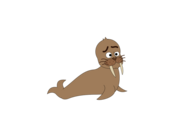Pinyin "wu2"
In MandarinBanana's mnemonic system, the Pinyin syllable "wu2" is split up into two parts: "w" and "Ø2". You can visit the Pinyin index to see how other Pinyin syllables are split up into initials and finals.
Mnemonics for Pinyin initial "w"
Mnemonics for Pinyin final "Ø2"
Characters pronounced wu2
surname Wu / area comprising southern Jiangsu, northern Zhejiang and Shanghai / name of states in Southern China at different historical periods
吴
=
口
+
天
:
Mnemonic symbol: the water buffalo from Wu.
Willy Walrus (w) enters the space station (Ø2) with a big mandarin (口) in his hands. The water buffalo (吴) sees it and begins to pant heavily, slightly in panic. Fortunately there is an angel (天) around to calm him down and let him know that it's not the sun he's fearing.
Willy Walrus (w) enters the space station (Ø2) with a big mandarin (口) in his hands. The water buffalo (吴) sees it and begins to pant heavily, slightly in panic. Fortunately there is an angel (天) around to calm him down and let him know that it's not the sun he's fearing.
not to have / no / none / not / to lack / un- / -less
Mnemonic symbol: 無爲, wu2 wei2, the state of non-doing after having attained complete harmony with the Tao.
Willy Walrus (w) has attained Wu Wei (無) just inside the space station's entrance (Ø2), while from the outside it may seem like he is napping.
Willy Walrus (w) has attained Wu Wei (無) just inside the space station's entrance (Ø2), while from the outside it may seem like he is napping.
无
=
一
+
𠂇
+
乚
:
Just inside the space station's entrance, Diogenes is annoyed by Willy Walrus, who's playing his flute. Diogenes just wants a peaceful time without being disturbed, so he cuts the flute into pieces with a pair of scissors, and threatens to beat Willy Walrus with a shovel should he annoy Diogenes again.

